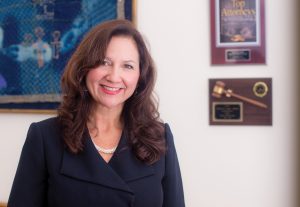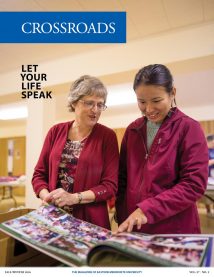
OVERLOOKING A COURTYARD in Lancaster, Pennsylvania, Triquetra Law offices are home to attorney Sharon R. López ’83, her law partner Andrea Farney, and bilingual litigation paralegal Anne Sensenig ’83. The three women work together on cases involving discrimination, civil rights, employee rights and appeals.
President-elect of the 27,000-member Pennsylvania Bar Association (PBA), López will become la primera Latina to lead the organization in its 121-year history. “I like to say, ‘the first, but not the last,’ she says. “That puts the emphasis on sponsoring others to walk through an opened door.”
Recognized by her alma mater Widener University Commonwealth Law School for her efforts to promote diversity in the legal profession and for excellence in public service, López strategically developed her career to advocate for her clients, her profession and her community.
Born to a Mexican father and a Pennsylvania Dutch mother, López moved to the United States from Latin America for elementary school. She remembers travelling to Mexico for “a perfect storm of family, food and fun.”
I was never alone and there was always something about to happen. I can still see my abuelita demanding the freshest tortillas at the tortilla factory, and my abuelito whistling as he stirred his coffee and winked at me. As a rule, we only spoke Spanish in Mexico, a challenge because the other 11 months, we spoke English in our Lancaster County home. Coming from another culture to another culture makes you see diver- sity as something normal.
After graduating from Lancaster Mennonite High School, López came to EMU, where she experienced “working with like-minded people to create change.” By her senior year, she also was chair of the Peace and Justice Fellowship.
In 1981, after completing an intensive course at the Spanish Language Institute in San José, she studied for one semester at the University of Costa Rica. While in San José, she saw real poverty alongside a well-fed middle class. “I learned a lot about my privilege,” López says.
I got to know a young woman with two children. With her permission we visited her “home.” The poverty she lived in was palatable destitution. I made the mistake of giving her $100 that evening. I wasn’t thinking of how the money would impact her life. I never saw her again. No one should live like that, but I should have been more careful about how I “helped” her. It was an important lesson.
López credits Professor Vernon Jantzi ‘64 for her first opportunity to serve as a community organizer and advocate. Jantzi set up an externship with the Costa Rica Department of Agriculture. She went to Coto Sur, a coastal region where peasant families moved onto abandoned banana plantations as part of Costa Rica’s formal agrarian reform.
Another influential mentor was Barbra Graber ‘76, then a theater professor and house parent for an intentional community. López joined the cast of Storm, “an improvisational piece focused on the tension between the sexes.”
Barbra was such a creative force. I was forced to look inward and examine my own bias about women. That play helped me make one of the most important decisions in my life, to be a feminist mother.
López returned to Lancaster, started a family and worked on various social justice issues, including AIDS prevention education and sexual assault awareness and victim services. She chose to attend law school to continue her work. “I thought it would give me good tools to create social change,” she says. “I still think it was a good choice for me.”
Now, as the next PBA president, she continues to find like-minded people. Nevertheless, members of the statewide professional association don’t all share her perspective. “True diversity and inclusion invites all the well-reasoned opinions to the table,” she says. “As long as we keep the dialogue going and respect each other, the social change ball will move forward. That is an EMU value I use in my justice work everyday. I am forever grateful for that.”
